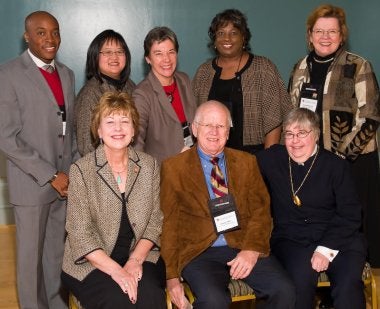

Student Affairs at COE – A Celebrated History

The College of Education has a proud history in student affairs graduate studies. Founded in 1959, as one of the first programs of its kind, COE’s student affairs concentration—formerly the college student personnel program—just celebrated its 60th anniversary.
Since its inauguration, the program has been a leader in the student affairs field. Student affairs personnel play a central role in higher education and their work focuses on facilitating the college student experience. The field tackles issues like the role of gender in career development, the educational pathway for Latinx students, and how faculty diversity influences the campus climate.
Students and faculty at COE focus on diverse research areas including inclusiveness and equity, social identity and intersectionality, student leadership development and learning outcomes. In particular, the program taught some of the first graduate courses in multiculturalism and furthered the study of student development theory, which guides student learning and personal development in post-secondary educational environments.
“In the early 1970s, the program made a substantive contribution to advancing student development theory with the work faculty member L. Lee Knfelkamp did with William Perry’s cognitive and ethical development model,” said Professor Emerita Susan Komives, who along with Knfelkamp and other early faculty, including Thomas Magoon, George Marx and Marylu McEwen, helped develop the program into what it is today.
“Dr. Komives really brought energy and momentum to the study of leadership, which has continued to influence student affairs internationally, including at UMD, while Dr. McEwen’s work on student development and identity was pioneering in our field,” said Student Affairs Program Director Dr. Julie J. Park.
Current faculty focus on topics ranging from the Asian American student experience to diversifying the profession, and work to further conversation on other timely issues in higher education through publishing and disseminating their work in journals and books. More still, student affairs faculty direct COE’s Center for Diversity and Inclusion in Higher Education, which is led by Professor Roger L. Worthington and Associate Clinical Professor Candace Maddox Moore, and provides expertise to universities worldwide on diversity, inclusion, and social justice topics in higher education.
“Our faculty contribute to critical national dialogues, from how to better support female faculty of color to consulting on key court cases that have tremendous implications for equity and access,” Dr. Park said. “I am so proud of the work that our faculty does in seeking to make universities more equitable and just environments.”
COE student affairs faculty have received many accolades for their work, including from the Association for the Study of Higher Education, the American Educational Research Association and, the Student Affairs Administrators in Higher Education (NASPA). Notably, Dr. Komives received NASPA’s 2019 John Blackburn Distinguished Pillar Award, the foundation’s highest honor. Moreover, faculty and graduates have held leadership responsibilities at prominent institutions in the field.
“Program faculty and alumni have served in numerous national leadership roles including as presidents of such associations as the ACPA: College Student Educators International, NASPA and, the Council for the Advancement of Higher Education,” Dr. Komives said.
Dedicated to the preparation of administrators and student development educators in higher education, the COE student affairs program offers graduate studies at the master’s and doctoral levels.
This article originally appeared in the Summer 2020 issue of Endeavors, the UMD College of Education's alumni magazine.



